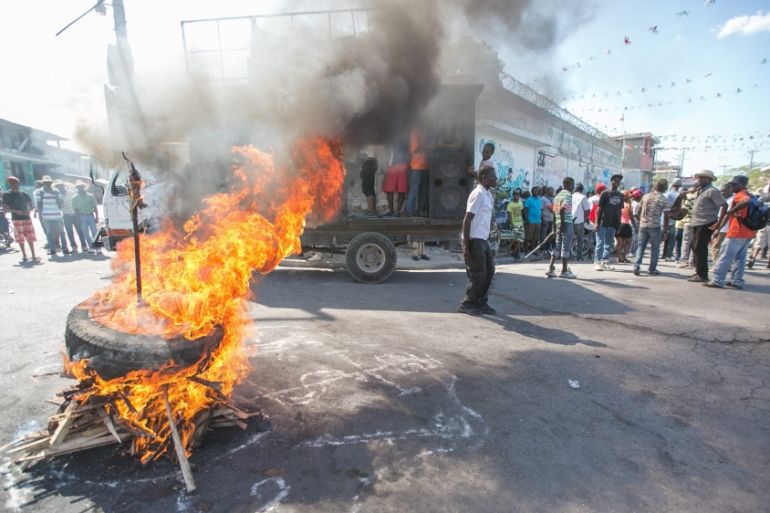Uncertainty grips Haiti ahead of interim leader vote
Parliament expected to elect temporary president to serve up to 120 days following last month’s botched election.

Haitian politicians were set to elect a temporary president to fill the power vacuum following the departure of Michel Martelly, after an election to choose his replacement was postponed amid violent protests.
Thirteen candidates applied to run in the election on Saturday – but only three paid the fee of around $8,400 and will participate.
|
|
The three contestants are Dejan Belizaire and Edgar Leblanc Fils – two former presidents of the Senate – and Jocelerme Privert, the current president of the National Assembly.
Under an agreement signed hours before the end of Martelly’s five-year term on February 7, the interim president will serve for up to 120 days.
Al Jazeera’s Teresa Bo, reporting from the capital Port-au-Prince, said: “This national assembly is supposed to get an interim president to get Haiti out of its worst political crisis since the former president was ousted from power back in 2004.
“We do not even know if this vote is going to happen. We just went inside the building and there were supposed to be 51 deputies but there were only 17,” Bo said.
“We also know that this is a very contested election. Large sectors within the opposition are saying this process shouldn’t be happening at all.
“People who were on the streets said they are ready to go back to the streets if whoever they want in power is not elected this time,” Bo added.
READ MORE: Problems rampant as Haiti cannot elect a new president
A January 24 runoff between Martelly’s favoured candidate, Jovenel Moise, and opposition leader Jude Celestin, was called off following violent protests by demonstrators alleging that foul play had helped the government candidate take the first round.
Last week’s agreement has set a new election date for April 24, with a new president installed on May 14, though Privert has stressed those were only proposed dates.
![Opposition supporters protest against the current electoral decision making process at the parliament in Haiti [EPA]](/wp-content/uploads/2016/02/14851a326827470a8d1027e4366d0581_18.jpeg)
Yet, the plan to elect an interim president by indirect vote has also angered opponents who have protested the electoral process for months.
Several hundred demonstrators marched in Port-au-Prince on Friday, criticizing the poll in parliament as an illegal process. Some politicians also questioned the legitimacy of Privert’s candidacy.
“Stop the parliamentary coup d’etat,” member of parliament Gary Bodeau said. “Parliament cannot be judge and jury … the process is not impartial.”
A potential long-term power vacuum is the latest challenge for the Caribbean country that is the poorest in the Americas.
Thirty years after the end of the Duvalier dictatorship, Haiti is still struggling to hold credible elections that would boost development and raise the standard of living for the 60 percent of the population living below the poverty line.